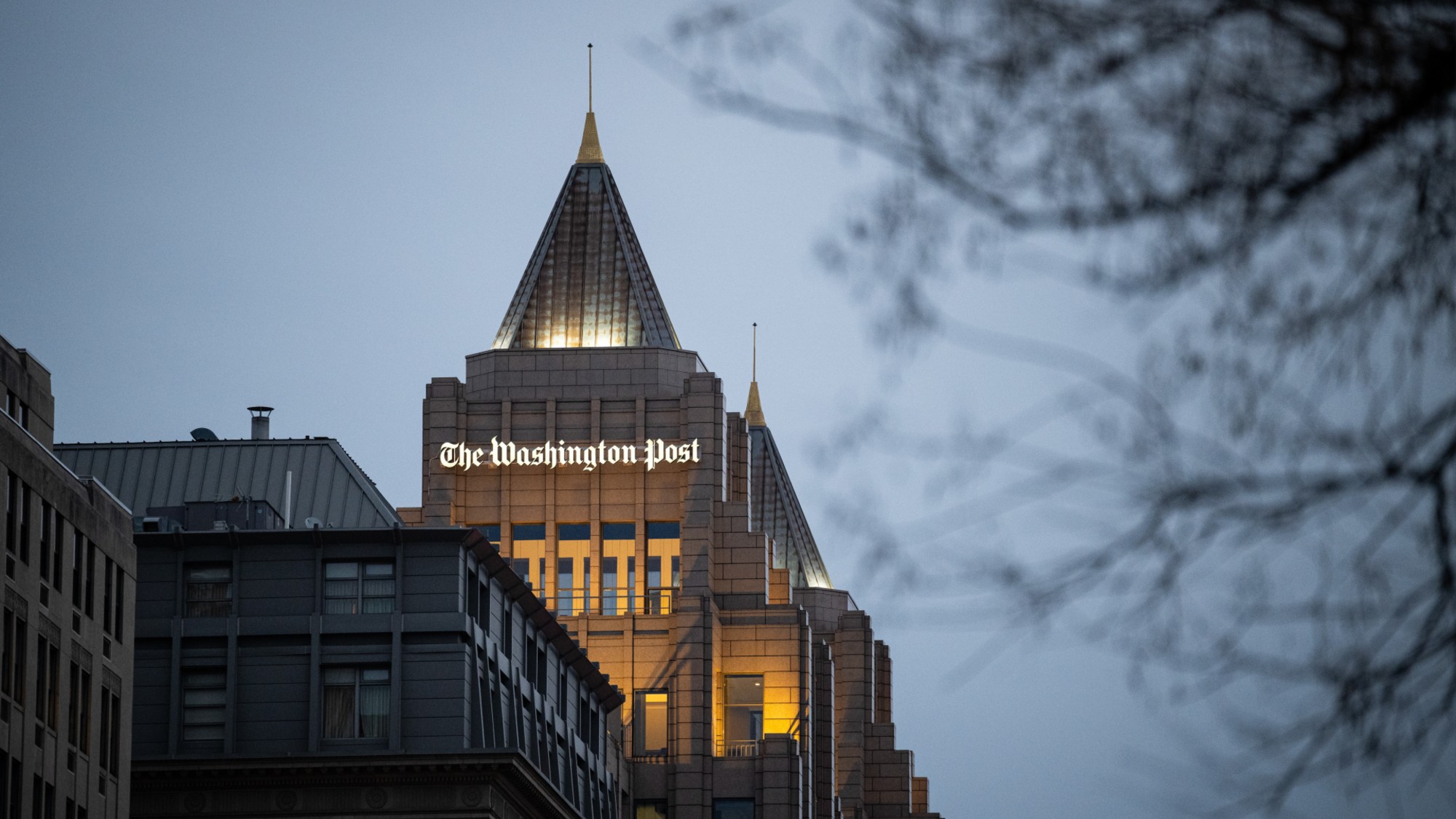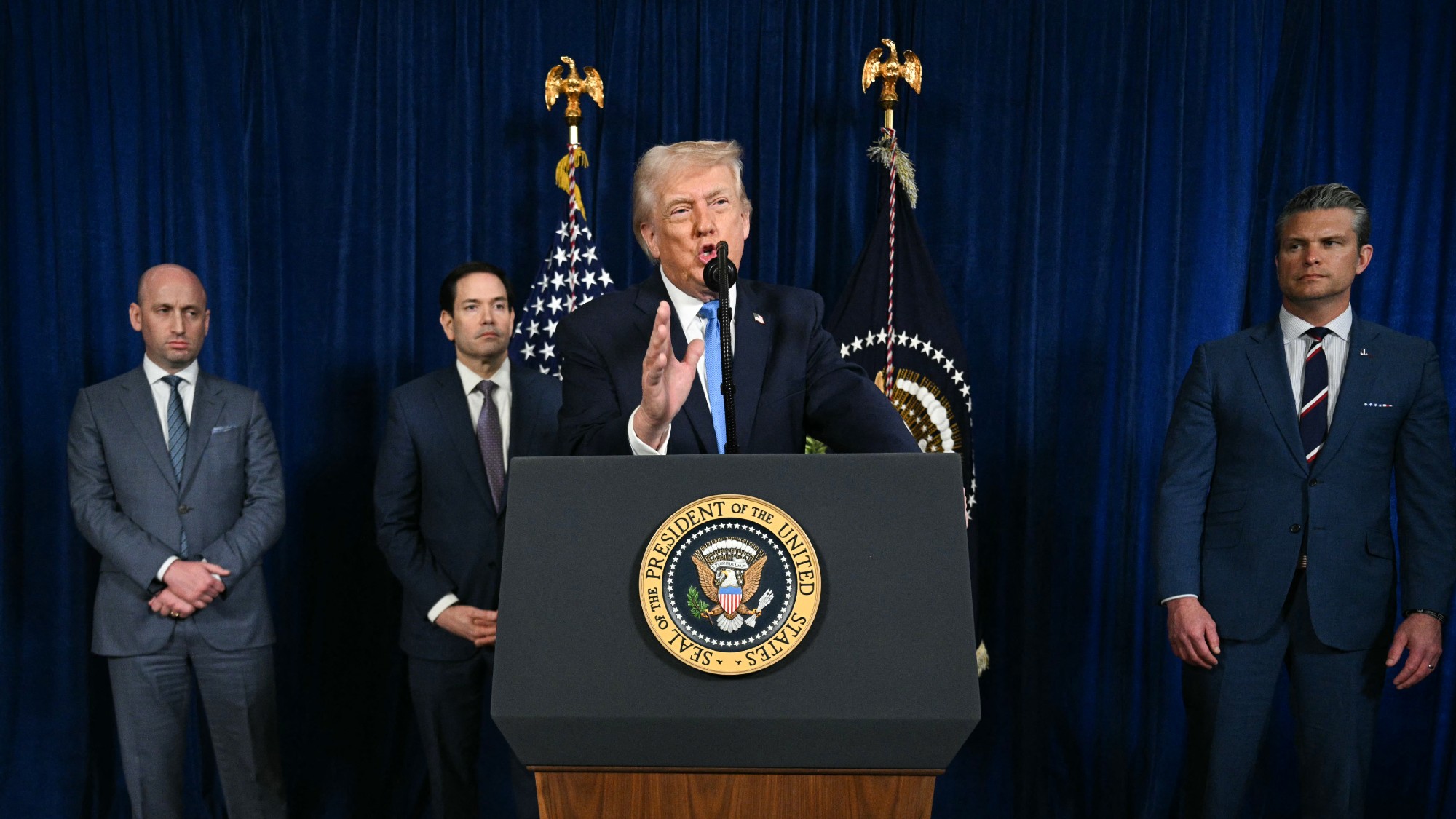Are we on the brink of a new era of nuclear proliferation?
Why a growing list of countries might conclude they need the bomb


A free daily email with the biggest news stories of the day – and the best features from TheWeek.com
You are now subscribed
Your newsletter sign-up was successful
In Vienna, American and Iranian officials are racing to find a way back in to the abandoned 2015 deal to restrain Iran's nuclear program before Tehran's uranium enrichment advances so far it's no longer plausible to turn it back. Things have already gone so far, in fact, that some observers wonder whether the effort is still worth it.
Meanwhile, in Berlin, French and German officials are attempting to restart another set of talks that have languished since 2015, the so-called Normandy format talks between Russia and Ukraine. As with Iran, the clock is ticking before fatal rubicons are crossed that cannot be crossed back.
Apart from being showcases for the possibilities and limits of diplomacy, the two negotiations would seem to have nothing in common. But under the surface, they both reflect the decline in the nuclear nonproliferation regime over the past quarter century — and suggest the possibility that we stand on the brink of a wider spread of nuclear weapons.
The Week
Escape your echo chamber. Get the facts behind the news, plus analysis from multiple perspectives.

Sign up for The Week's Free Newsletters
From our morning news briefing to a weekly Good News Newsletter, get the best of The Week delivered directly to your inbox.
From our morning news briefing to a weekly Good News Newsletter, get the best of The Week delivered directly to your inbox.
To explain why, we have to take a trip back to 1994.
1994 was a banner year for nuclear non-proliferation efforts. It was the year the United States and North Korea entered into the Agreed Framework, which provided North Korea with light water reactors in exchange for them shutting down their existing nuclear power plant, which was far more useful for supporting a clandestine nuclear weapons program. The agreement was made at the last minute, averting a confrontation that could easily have led to war.
But within a decade, it was undone, with both the United States and North Korea blaming each other for violating its terms. North Korea acknowledged it had been conducting a secret nuclear weapons program with support from Pakistan, withdrew from the Nuclear Nonproliferation Treaty in 2003, and within a few years had become a full-fledged nuclear power.
Also in 1994, Ukraine agreed to destroy the vast nuclear arsenal it inherited with the collapse of the Soviet Union, accepting the assurances of the Budapest Memorandum in exchange. Ukraine had limited choice in the matter — they had no operational control of the weapons, and both the United States and Russia firmly pressured them to relinquish them. Nonetheless, the agreement was widely hailed as a landmark of nonproliferation.
A free daily email with the biggest news stories of the day – and the best features from TheWeek.com
Once again, diplomacy failed to hold over the long term, but with very different consequences. Ukraine now faces overt coercion by Russia, its nuclear-armed neighbor, an outcome that was predictable — and predicted — in 1994.
The lesson American hawks tend to take from contrasts like the foregoing is that diplomacy is futile and America should rely instead on threats of force. If Iran doesn't give up its nuclear program, we should destroy that program militarily. If Russia doesn't stop threatening Ukraine, we should be prepared to repel them.
But this is a doctrine premised on frankly fantastic assessments of American power, and an appalling indifference to the terrible costs of war. Indeed, it doesn't even reckon with the ways in which America's penchant for interventionism has undermined the nonproliferation regime we claim to be enforcing. After our catastrophic war in Iraq, undertaken ostensibly to end the threat of Iraqi weapons of mass destruction that did not exist, Libya revealed and dismantled its own clandestine nuclear program to avoid a similar fate. When NATO attacked Libya several years later, the lesson was well-learned in capitals around the world.
That lesson is the truly important one that connects Ukraine and Iran: Nuclear weapons are too indiscriminately destructive to be very useful as offensive weapons. But they are quite useful for states under threat from large and powerful neighbors, or from more distant but hostile great powers. In an era characterized by great power competition rather than cooperation, that obvious utility may be increasingly hard for diplomacy to overcome.
Consider Iran's rational assessment of their interests. They have been repeatedly threatened by American administrations. When they agreed with one American administration to accept restrictions on their nuclear weapons program, the next American administration promptly tore up the deal. Knowing nothing else, it would make sense for Iran to hedge their bets and preserve the option to follow the North Korea path simply to preserve a deterrent against a future American attack.
By the same logic, however, if the United States fails to restrain Iran by diplomatic means, it would be rational for Saudi Arabia, Turkey, and other states in the region to consider their own deterrent capacity. Would they trust that the United States would remain robust in their defense against an Iran that, no doubt, would operate with greater impunity in a world where it operated from behind a nuclear shield? Looking at our response to the Ukraine crisis, they should rationally have their doubts.
Nor is the Middle East the only theater where the logic of nuclear proliferation could take hold. China has made it clear that the reabsorption of Taiwan is their paramount foreign policy priority, and their military capacity to achieve that goal by force continues to burgeon. America's ability to prevent an invasion, meanwhile, is increasingly in doubt, even as we have gotten closer and closer to formally committing to doing so. Taiwan's best security lies in its own ability to deter invasion. At some point, might they not consider nuclear weapons as an indispensable element in such a strategy?
Once you start making lists, it's hard to stop. If Ukraine is dismembered, should Poland trust NATO will protect them forever? And shouldn't Venezuela worry that one day an American president will decide to do what former President Donald Trump failed to do and rid himself of a troublesome annoyance?
From the U.K. and France to China and India, to Pakistan and Israel and North Korea, today's nuclear powers made their choices to cross the atomic rubicon to deter more-powerful neighbors and avoid being too dependent on more-powerful allies. Nuclear weapons couldn't solve all their foreign policy problems and were certainly no substitute for building the economic and demographic strength that sustains broader military capability. But they did preclude winding up in Ukraine's position.
For a surprisingly long list countries eager to avoid a similar fate, that might be reason enough.
Noah Millman is a screenwriter and filmmaker, a political columnist and a critic. From 2012 through 2017 he was a senior editor and featured blogger at The American Conservative. His work has also appeared in The New York Times Book Review, Politico, USA Today, The New Republic, The Weekly Standard, Foreign Policy, Modern Age, First Things, and the Jewish Review of Books, among other publications. Noah lives in Brooklyn with his wife and son.
-
 Can Europe regain its digital sovereignty?
Can Europe regain its digital sovereignty?Today’s Big Question EU is trying to reduce reliance on US Big Tech and cloud computing in face of hostile Donald Trump, but lack of comparable alternatives remains a worry
-
 The Mandelson files: Labour Svengali’s parting gift to Starmer
The Mandelson files: Labour Svengali’s parting gift to StarmerThe Explainer Texts and emails about Mandelson’s appointment as US ambassador could fuel biggest political scandal ‘for a generation’
-
 Magazine printables - February 13, 2026
Magazine printables - February 13, 2026Puzzle and Quizzes Magazine printables - February 13, 2026
-
 ‘My donation felt like a rejection of the day’s politics’
‘My donation felt like a rejection of the day’s politics’Instant Opinion Opinion, comment and editorials of the day
-
 How Iran protest death tolls have been politicised
How Iran protest death tolls have been politicisedIn the Spotlight Regime blames killing of ‘several thousand’ people on foreign actors and uses videos of bodies as ‘psychological warfare’ to scare protesters
-
 ‘It may portend something more ominous’
‘It may portend something more ominous’Instant Opinion Opinion, comment and editorials of the day
-
 What are Donald Trump’s options in Iran?
What are Donald Trump’s options in Iran?Today's Big Question Military strikes? Regime overthrow? Cyberattacks? Sanctions? How can the US help Iranian protesters?
-
 Unrest in Iran: how the latest protests spread like wildfire
Unrest in Iran: how the latest protests spread like wildfireIn the Spotlight Deep-rooted discontent at the country’s ‘entire regime’ and economic concerns have sparked widespread protest far beyond Tehran
-
 The billionaires’ wealth tax: a catastrophe for California?
The billionaires’ wealth tax: a catastrophe for California?Talking Point Peter Thiel and Larry Page preparing to change state residency
-
 What is the Donroe Doctrine?
What is the Donroe Doctrine?The Explainer Donald Trump has taken a 19th century US foreign policy and turbocharged it
-
 Bari Weiss’ ‘60 Minutes’ scandal is about more than one report
Bari Weiss’ ‘60 Minutes’ scandal is about more than one reportIN THE SPOTLIGHT By blocking an approved segment on a controversial prison holding US deportees in El Salvador, the editor-in-chief of CBS News has become the main story
